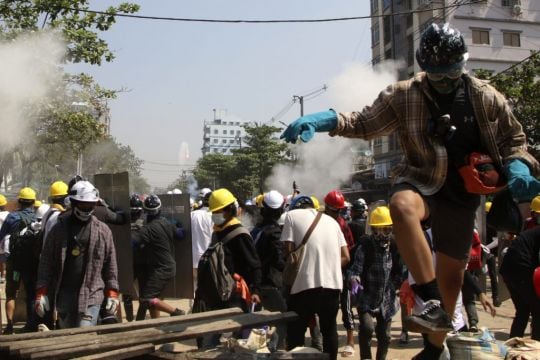Police in Myanmar’s ancient former capital, Bagan, opened fire on Sunday on demonstrators protesting over last month’s military takeover, wounding several people, according to witness accounts and videos on social media.
At least five people were reported injured as police sought to break up the protest, and photos showed one young man with bloody wounds on his chin and neck, believed to have been caused by a rubber bullet.
Bullet casings collected at the scene indicated that live rounds were also fired.
The city, located in the central Mandalay region, is a Unesco World Heritage Site in recognition of the more than 2,000 pagodas or their remnants still situated there, dating from the ninth to 13th centuries, when it was the capital of a kingdom that later became known as Burma and is now Myanmar.

Bagan is best known for being one of the country’s top tourist attractions, but it has also been the scene of large protest marches against the military’s seizure of power on February 1.
Large protests have occurred daily in many cities and towns across Myanmar, and security forces have responded with greater use of lethal force and mass arrests.
At least 18 protesters were shot and killed on February 28, and 38 on Wednesday, according to the UN Human Rights Office.
More than 1,500 people have been arrested, the independent Assistance Association for Political Prisoners said.
Protests elsewhere on Sunday, including in the two biggest cities of Yangon and Mandalay, were also met with the use of force by police firing warning shots, and variously employing tear gas, rubber bullets and stun grenades.
Multiple reports from Yangon said there were also police raids on Saturday night seeking to seize organizers and supporters of the protest movement.

A ward chairman from Aung San Suu Kyi’s National League for Democracy party, which was ousted from power in the coup, was found dead in a military hospital on Sunday morning by fellow residents of his Pabedan neighbourhood, according to a post on Facebook by NLD poltician Sithu Maung.
Suspicion was rampant on social media that Khin Maung Latt, 58, died due to a beating in custody after being taken from his residence, but no official cause of death was immediately announced.
In Yangon and elsewhere, raids are carried out nightly after an 8pm curfew by police and soldiers. The arrests are often carried out at gunpoint, without warrants.
In videos taken on Saturday night and posted online, sporadic fire from heavy weapons could be heard in some neighbourhoods.
The escalation of violence has put pressure on the global community to act to restrain the junta.

The coup reversed years of slow progress toward democracy in Myanmar, which for five decades had languished under strict military rule that led to international isolation and sanctions.
Ms Suu Kyi’s party led a return to civilian rule with a landslide election victory in 2015, and with an even greater margin of votes last year.
It would have been installed for a second five-year term last month, but instead Ms Suu Kyi and President Win Myint and other members of the government were placed in military detention.
A rare light note was struck on Saturday when demonstrators in the central city of Monywa poured cans of beer over their feet and those of passers-by to show their contempt for the brewery’s owners – the military.
Myanmar Beer is one of a number of business concerns in the country that are linked to the generals and has seen its sales plummet in the weeks following the coup.
It has also lost its Japanese partner, Kirin, which announced it was pulling out of the joint venture as a result of the power grab.

In neighbouring Thailand, several thousand people, Thai as well as from Myanmar, rallied outside the regional office of the United Nations on Sunday to bring attention to the crisis and their desire for international action to end the junta’s violence.
“I have a good life here, but I’m fighting for my relatives and families and friends in Myanmar. Since day one (when) the military took our leader, we are here,” said 26-year-old Aye Nanda Soe, who works in digital marketing and lives in Bangkok with her mother and brother while her father resides in Yangon.
“We want the UN to protect our people first, then help our leader. My people are not safe anymore.”







